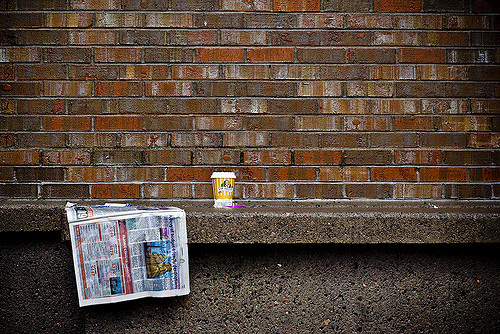Like this article? rabble is reader-supported journalism. Chip in to keep stories like these coming.
We in the media, who report and comment on the world, are not so good at reporting and commenting on ourselves. But here goes.
The media world, the newspaper business in particular, are in something resembling a full-bore meltdown.
Newspapers have been closing by the hundreds in Europe and North America over the past decade or more (a couple more in Canada in January — the Guelph Mercury and the Nanaimo Daily News — with large layoffs elsewhere).
Many more survive as hollow shells of their former selves.
In the U.S., nearly half of newsroom jobs were lost in the six years up to 2012 (the latest figures), with no slacking since.
The U.K’s influential The Guardian, itself under pressure, cast an eye this way recently and said it looked as if “Canada’s newspaper industry is in worse shape than equivalents in the U.S., U.K and Australia.”
That might be partly because our media (newspapers and TV/radio) are the most concentrated in the Western world — a fact bemoaned by three public inquiries since 1970.
They all asked the federal government to do something about it, to no avail.
But the big cause is that newspapers have been losing advertising to the money-sucking behemoths of the Internet.
North American newspapers are estimated to have lost three-quarters of their classified ads to the likes of Kijiji and Craigslist and half their general ads to the likes of Google and Facebook, outfits that pop them up as clickbait on your device.
Last year Google’s revenues surpassed those of the entire U.S. newspaper industry.
At this newspaper, this reality has translated itself into the present strike of editorial staff.
They walked off after the paper demanded a five per cent reduction in their annual wages, an increase in the work week to 40 hours from 35, changes to the pension, some layoffs and a contract that seems to neuter the union.
Management replies that this may be rough but it will actually leave editorial staff among the most well-off in the country.
This paints the situation in rather stark black and white.
So what now? I was startled to hear the head of the King’s journalism school, Kelly Toughill, say on CBC that this newspaper is unlikely to survive.
Then I found that this is the standard view of media analysts about newspapers everywhere, usually with the qualifier “in their present form.”
If declines in printed circulation continue, says Ken Goldstein, a prominent Winnipeg-based media business analyst, “it is likely there will be few, if any printed newspapers by 2025.”
Those who survive, he says, will have preserved their brand without printed editions.
This sounds a bit apocalyptic. Trends don’t go on forever.
But newspapers everywhere are trying like crazy to cash in on their websites — hard to do because people have been conditioned to get news for free on the Internet.
Some U.S. papers, and Montreal’s La Presse, have gone digital for five days with a blockbuster print edition on Saturday.
Some in the U.S. are printing every second day.
Not a lot of evidence yet that any of this works — except at the New York Times, which some analysts were saying was finished a couple of years ago.
It has announced that its paid digital subscriptions have hit a million (half its total circulation).
As a result its 2015 fourth-quarter profits are up 48 per cent.
We’re not all the New York Times, of course.
But there is something to be said about the Chronicle Herald. This is actually a special case — virtually the only independent daily in English Canada (there are a couple of tiny ones in the Yukon), and the largest overall.
Montreal’s Le Devoir, owned on a co-operative basis, is the other significant one. New Brunswick’s L’Acadie Nouvelle rounds out the list.
This gives the Chronicle Herald a powerful brand — it’s hard to imagine Nova Scotia without it, and hopefully it never comes to that — and a chance to be different.
But here’s something else.
Wherever it’s happening, merely surviving is not enough.
Newspapers are still mainly where news begins — and where the Internet, and even, often, television, mostly steals it from.
More and more people are getting their “news” from Facebook and Twitter — where “news,” publicity, innuendo, “promoted stories” and baloney meld.
Standards of fact-checking and editorial judgment require sure hands if the complexities of government, business and society generally are to be covered as they should.
At this newspaper, we’re talking about the people now on strike, who can’t be replaced by freelancers and overworked managers indefinitely.
I know nothing of the inner dynamic of either management or union in this case, but as the old guy of journalism around here, with nearly 50 years at it, let me put out a heartfelt call to both sides to capitalize on whatever wiggle room there is.
This is no ordinary labour dispute. A settlement roughly acceptable to both sides would be a huge victory over the media mayhem I’ve described above.
Ralph Surette is a freelance journalist in Yarmouth County. This column was first published in the Chronicle Herald.
Photo: Sean Dixon/flickr
Like this article? rabble is reader-supported journalism. Chip in to keep stories like these coming.



